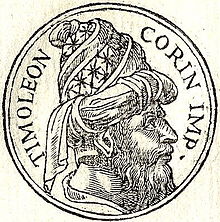Timoleon
In response, Timoleon, who had earlier heroically saved his brother's life in battle, and after repeatedly pleading with him to desist,[4] became involved in the assassination of Timophanes.
[5] Most Corinthians approved his conduct as patriotic; however, the tragic occurrence, the actual fratricide, the curses of his mother, and the indignation of some of his fellow citizens, drove him into a self-imposed early withdrawal from politics and civic life for twenty years.
[6] Because of inner strife, the depredations and decline in Syracuse caused by the despots Dionysius I and his son who succeeded him, and because of the repeated conflicts with powerful Carthage, a group of Syracusans sent an appeal for help to Corinth, their mother city, which reached that city-state in 344 BC.
[7] Corinth agreed to help, but her chief citizens declined to accept the seemingly hopeless task of establishing a stable government in tyrannical, fractious, insecure, and turbulent Syracuse.
[5] Following the siege of Syracuse, Dionysius II surrendered Ortygia in 343 BC on the condition of his being granted a safe conduct to Corinth, where he ended his life as a private, well-off, citizen.
[6] He at once began the work of restoration, beginning with the symbolic act of destroying the citadel constructed and used by the tyrants to oppress the people of Syracuse, and replacing it with a courthouse.
Against all odds, after being deserted by a part of his army who believed that facing a foe six times as large as their own was hopeless, Timoleon, at the head of his infantry, won a great and decisive victory on the Crimissus.
He remained almost universally admired for his brilliant victories, moderation, and the restoration of democracy after half a century of tyranny, suffering, near economic collapse, turmoil, and depopulation.
[11] When taken to court on spurious grounds, Timoleon refused to be exempted, saying that this was the "precise purpose for which he had so long laboured and combated—in order that every Syracusan citizen might be enabled to appeal to the laws and exercise freely his legal rights.


